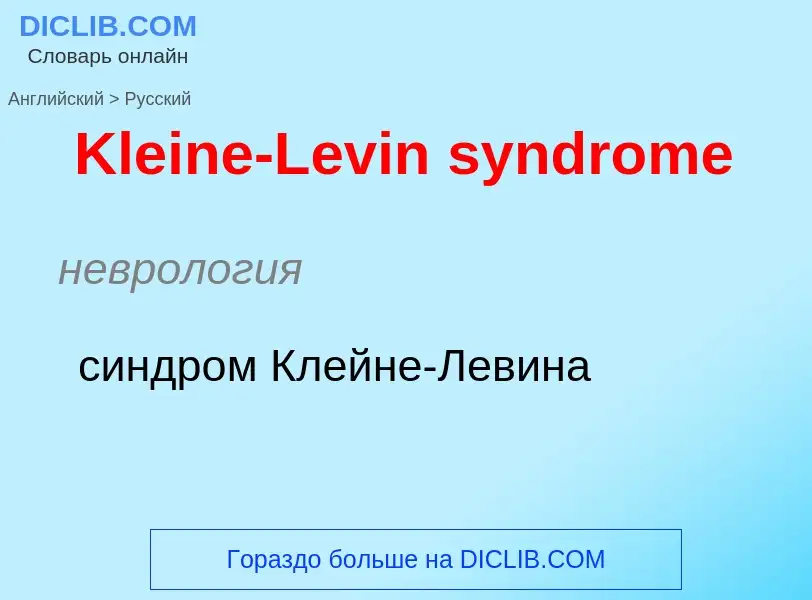Translation and analysis of words by ChatGPT artificial intelligence
On this page you can get a detailed analysis of a word or phrase, produced by the best artificial intelligence technology to date:
- how the word is used
- frequency of use
- it is used more often in oral or written speech
- word translation options
- usage examples (several phrases with translation)
- etymology
Kleine-Levin syndrome - translation to russian
неврология
синдром Клейне-Левина
['levin]
существительное
устаревшее выражение
молния
вспышка молнии
Definition
---
Борис Михайлович (1898/99-1940) , русский писатель. В центре повести "Жили два товарища" (1931) и романа "Юноша" (1932-33) - герои, ищущие свой путь и стремящиеся разобраться в противоречиях окружающей действительности.
---
Владимир Алексеевич (р. 1939), российский ученый, член-корреспондент РАН (1994). Труды по механике жидкостей газов.
---
Владимир Константинович (р. 1929), российский ученый, член-корреспондент РАН (1991; член-корреспондент АН СССР с 1987). Труды по разработке элементной базы и структуры высокопроизводительных вычислительных комплексов. Ленинская премия (1957), Государственная премия СССР (1982).
---
(Lewin) Курт (1890-1947) , немецко-американский психолог. В 20-х гг. представитель гештальт-психологии, экспериментального исследования воли и аффекта. С 1932 в США, разработал концепцию личности, в основе которой - понятие "поля" (заимствованное из физики) как единства личности и ее окружения. Один из основоположников экспериментального исследования мотивации и психологии групп (т. н. групповой динамики).
---
Леонид Менделевич (р. 1936), белорусский архитектор. Один из авторов мемориального комплекса "Хатынь" (1968-69). Ленинская премия (1970).
---
Юрий Давидович (р. 1920), российский литературовед, доктор филологических наук (1969). Основная сфера интересов: международные связи русской литературы (преимущественно русско-английские), история перевода в России. Книги: "Оссиан в русской литературе" (1980), "Русские переводчики 19 в. и развитие художественного перевода" (1985), "Шекспир и русская литература 19 в." (1988) и др.
Wikipedia
Kleine–Levin syndrome (KLS) is a rare neurological disorder characterized by persistent episodic hypersomnia accompanied by cognitive and behavioral changes. These changes may include disinhibition, sometimes manifested through hypersexuality, hyperphagia or emotional lability, and other symptoms, such as derealization. Patients generally experience recurrent episodes of the condition for more than a decade, which may return at a later age. Individual episodes generally last more than a week, sometimes lasting for months. The condition greatly affects the personal, professional, and social lives of those with KLS. The severity of symptoms and the course of the syndrome vary between those with KLS. Patients commonly have about 20 episodes over about a decade. Several months may elapse between episodes.
The onset of the condition usually follows a viral infection (72% of patients); several different viruses have been observed to trigger KLS. It is generally only diagnosed after similar conditions have been excluded; MRI, CT scans, lumbar puncture, and toxicology tests are used to rule out other possibilities. The syndrome's mechanism is not known, but the thalamus is thought to possibly play a role. SPECT has shown thalamic hypoperfusion in patients during episodes.
KLS is very rare, occurring at a rate of 1 in 500 000, which limits research into genetic factors. The condition primarily affects teenagers (81% of reported patients), with a bias towards males (68-72% of cases), though females can also be affected, and the age of onset varies. There is no known cure, and there is little evidence supporting drug treatment. Lithium has been reported to have limited effects in case reports, decreasing the length of episodes and duration between them in some patients. Stimulants have been shown to promote wakefulness during episodes, but they do not counteract cognitive symptoms or decrease the duration of episodes. The condition is named after Willi Kleine and Max Levin, who described cases of the disease in the early 20th century. It was added to the International Classification of Sleep Disorders in 1990.

